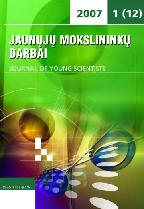Rizikos grupės vaikų socialinės raidos ypatybės ugdymosi kontekste
Characteristics of Social Development of Risk Group Children within the Educational Context
Author(s): Asta Vaitkevičienė, Vita JozėnaitėSubject(s): Social Sciences
Published by: VšĮ Šiaulių universiteto leidykla
Keywords: Risk group children; deviant (asocial) behaviour; education motivation; relations in the class; development in the family
Summary/Abstract: Integration difficulties of children and teenagers into school, emotional and behavior problems are particularly identifiable in not big town. It is especially important to take into consideration and to recognize them for the reason that these teenagers will have to join society, start their families and form a life model. We have to clarify the most important reasons for improper behavior and to define communication problems these schoolchildren encounter if we want to help them develop sufficient life experience and pro-social behavior norms. A survey in a questionnaire interview form was performed aiming to analyze social development characteristics of risk group children within the educational context. Statistical data analysis (descriptive, frequencies, averages, correlative, chi-square test) was done. 100 schoolchildren from risk group families, 100 schoolchildren from other families, 100 pedagogues of secondary education schools and 100 parents of risk group families participated in the survey. A relation between development features, behavior expression in the social environment of risk group children and of other children by comparing to the development in the family was analyzed in the empirical part of the paper. The most important conclusions of the empirical research are the following: • Obtained results showed that fulfilment of psychosocial needs of children from social risk families is weak, and that influences educational characteristics. • Research results showed significant differences in educational aims, which are conditioned by the parents’ attitudes to education. Schoolchildren from non-risk families are more future oriented, what conditions high learning results. Children from risk group families consolidate their status in the group of the same age children as their most important motif. • It was found out that children from risk group families are less prepared for social and academic requirements raised by school compared to their peers therefore many different problems caused by improper behavior occur in their social environment. • Relative characteristic differences were statistically identified. Schoolchildren from social risk group families were more often involved in fray, threatened and frightened other persons, had relations with problem teenagers, compared to other children of the same age.
Journal: Jaunųjų mokslininkų darbai
- Issue Year: 2008
- Issue No: 2(18)
- Page Range: 234-239
- Page Count: 6
- Language: Lithuanian

